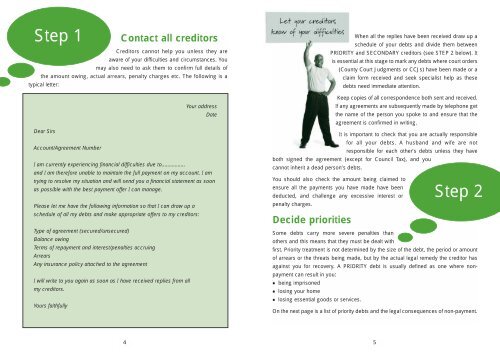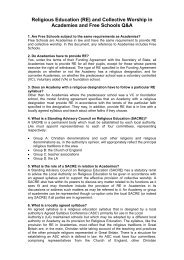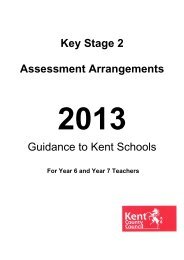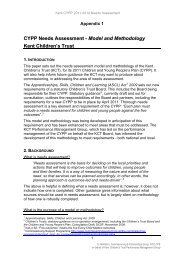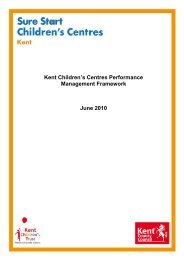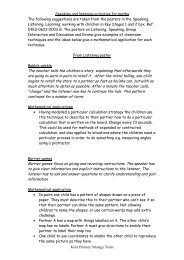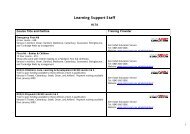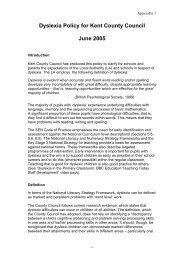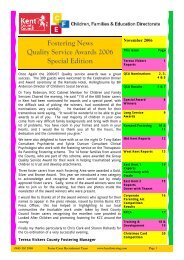Self Help Guide to dealing with debt - Kent Trust Web
Self Help Guide to dealing with debt - Kent Trust Web
Self Help Guide to dealing with debt - Kent Trust Web
Create successful ePaper yourself
Turn your PDF publications into a flip-book with our unique Google optimized e-Paper software.
Step 1<br />
Contact all credi<strong>to</strong>rs<br />
Credi<strong>to</strong>rs cannot help you unless they are<br />
aware of your difficulties and circumstances. You<br />
may also need <strong>to</strong> ask them <strong>to</strong> confirm full details of<br />
the amount owing, actual arrears, penalty charges etc. The following is a<br />
typical letter:<br />
Your address<br />
Date<br />
Dear Sirs<br />
Account/Agreement Number<br />
I am currently experiencing financial difficulties due <strong>to</strong>................<br />
and I am therefore unable <strong>to</strong> maintain the full payment on my account. I am<br />
trying <strong>to</strong> resolve my situation and will send you a financial statement as soon<br />
as possible <strong>with</strong> the best payment offer I can manage.<br />
Please let me have the following information so that I can draw up a<br />
schedule of all my <strong>debt</strong>s and make appropriate offers <strong>to</strong> my credi<strong>to</strong>rs:<br />
Type of agreement (secured/unsecured)<br />
Balance owing<br />
Terms of repayment and interest/penalties accruing<br />
Arrears<br />
Any insurance policy attached <strong>to</strong> the agreement<br />
I will write <strong>to</strong> you again as soon as I have received replies from all<br />
my credi<strong>to</strong>rs.<br />
Yours faithfully<br />
When all the replies have been received draw up a<br />
schedule of your <strong>debt</strong>s and divide them between<br />
PRIORITY and SECONDARY credi<strong>to</strong>rs (see STEP 2 below). It<br />
is essential at this stage <strong>to</strong> mark any <strong>debt</strong>s where court orders<br />
(County Court Judgments or CCJs) have been made or a<br />
claim form received and seek specialist help as these<br />
<strong>debt</strong>s need immediate attention.<br />
Keep copies of all correspondence both sent and received.<br />
If any agreements are subsequently made by telephone get<br />
the name of the person you spoke <strong>to</strong> and ensure that the<br />
agreement is confirmed in writing.<br />
It is important <strong>to</strong> check that you are actually responsible<br />
for all your <strong>debt</strong>s. A husband and wife are not<br />
responsible for each other’s <strong>debt</strong>s unless they have<br />
both signed the agreement (except for Council Tax), and you<br />
cannot inherit a dead person’s <strong>debt</strong>s.<br />
You should also check the amount being claimed <strong>to</strong><br />
ensure all the payments you have made have been<br />
deducted, and challenge any excessive interest or<br />
penalty charges.<br />
Decide priorities<br />
Some <strong>debt</strong>s carry more severe penalties than<br />
others and this means that they must be dealt <strong>with</strong><br />
first. Priority treatment is not determined by the size of the <strong>debt</strong>, the period or amount<br />
of arrears or the threats being made, but by the actual legal remedy the credi<strong>to</strong>r has<br />
against you for recovery. A PRIORITY <strong>debt</strong> is usually defined as one where nonpayment<br />
can result in you:<br />
• being imprisoned<br />
• losing your home<br />
• losing essential goods or services.<br />
Step 2<br />
On the next page is a list of priority <strong>debt</strong>s and the legal consequences of non-payment.<br />
4<br />
5


